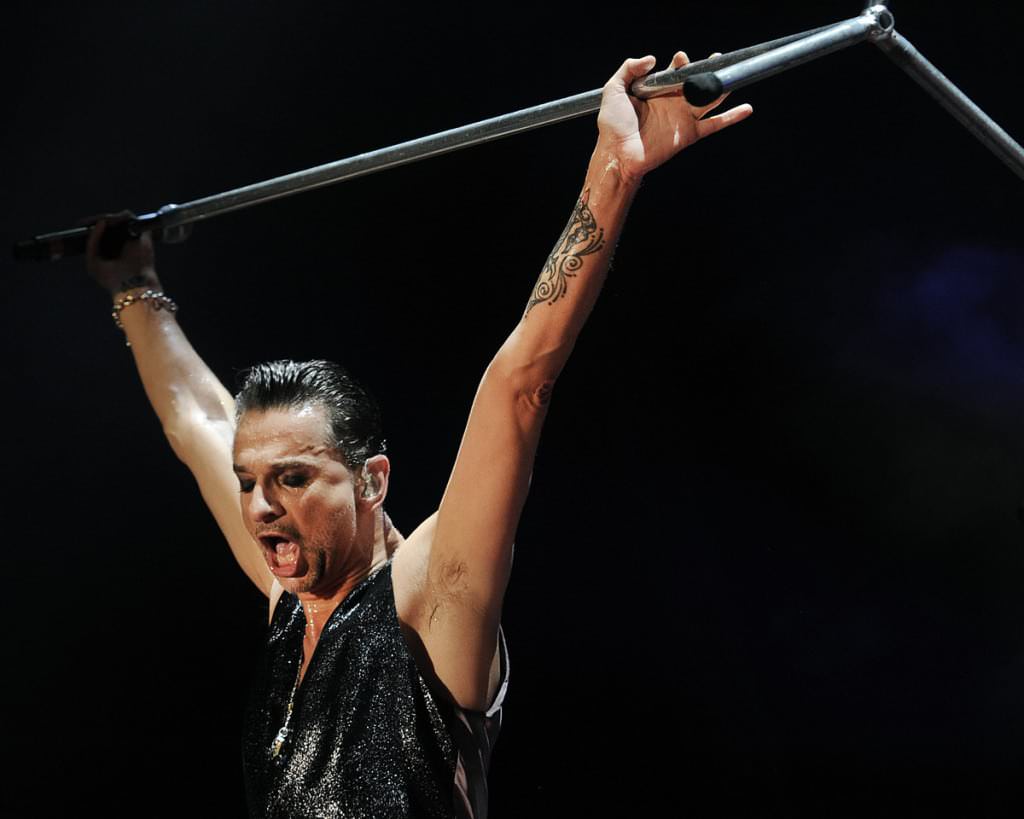The crowd at Depeche Mode’s Delta Machine sold-out Sunday night show at Toronto’s Molson Ampitheatre may have given the impression that there were a heckuva lot of babysitters on duty across the GTA, but the music hardly sounded as old as much of the audience.
That’s the benefit of being an electronic act, even one as guitar-fuelled as Depeche Mode. They can update the synth sounds to belie the fact that the UK band has been around since 1980. Or maybe vintage synth sounds have become so de rigeur during the last decade that Depeche Mode has collapsed into its own pocket universe where time is meaningless. Which is a pretty good metaphor for a nostalgic show like this which, ultimately, makes both the band and their fans feel young again. But there was something more at work.
Hits like “Enjoy The Silence,” “Policy of Truth” and “Walking In My Shoes” don’t sound as darkly futuristic as when they came out. But as performed by now-ageless Dave Gahan (51, actually, but now boasting six-pack abs when the ex-junkie was once lucky to just be alive), guitarist-songwriter Martin Gore and keyboardist Andrew Fletcher, they now sound timeless.
This was especially true of “Personal Jesus,” which was begun as a slow, old-timey western ballad before the guitar hook crunched in and knocked us all down even as we shouted out the chorus.
It helps that the new songs off their 2013 album “Delta Machine” — at least the singles “Angel” and “Heaven” — fit so snugly alongside the old songs, even if their choruses aren’t quite as sing-alongable, and that Gahan’s baritone hasn’t lost any of its dramatic heft. (Neither has Gore’s vocals on his trio of lead vocal tracks, even leading him to admit “It’s like a musical” during fan favourite “But Not Tonight.”)
If there was any doubt of the continued power of Depeche Mode, it was quickly dissipated by the tight-shirted gentleman who enthused to me: “These guys liberate my fucking soul, bro!” Yes, the gayest straight band in history — one whose shirtless fifty-something lead singer gleefully humped the mic stand while doing jazz hands — has young bro fans, too.
So why does Depeche Mode still feel so current compared to their 80s new wave and synthpop brethren? Well, we earlier asked original member Andy Fletcher to find out.
A lot’s changed in the music scene in the last four years since your previous album, particularly the rise of EDM in North America. How do you think that is going to impact the return of Depeche Mode?
I don’t think it directly affects it, because I think we’re deemed to be sort of the grandfathers of it, but not directly the stars of it. Obviously, if lots of young people are listening to electronic music that’s always going to be good for us. I don’t think it’s going to be a massive wave of hundreds of thousands of 16 or 17 year olds going to Depeche Mode concerts.
